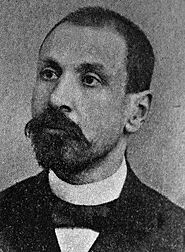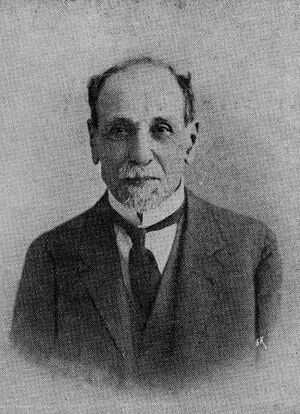Pavlos Karolidis facts for kids
Quick facts for kids
Pavlos Karolidis
|
|
|---|---|
 |
|
| Member of the Ottoman Parliament | |
| In office 1908–1912 |
|
| Personal details | |
| Born | c. 1849 Kayseri, Cappadocia, Ottoman Empire |
| Died | 26 July 1930 (aged 80–81) Athens, Greece |
| Nationality | Ottoman Greek |
| Occupation | Politician, historian |
Pavlos Karolidis (Greek: Παύλος Καρολίδης), born around 1849 and died on July 26, 1930, was an important Greek historian. He lived during the late 1800s and early 1900s. He was known for his teaching and his work in politics.
Contents
His Early Life and Education
Pavlos Karolidis was born in 1849 in a village called Androniki. This village is now part of Kayseri in a region called Cappadocia. His father, Konstantinos Karolidis, was a rich landowner and sold wheat.
Even though his first language was Ottoman Turkish, Pavlos went to Greek schools. He studied at two of the best Greek schools in the Ottoman Empire. These were the Great School of the Nation in Constantinople and the Evangelical School of Smyrna.
In 1867, he started studying at the University of Athens. Then, in 1870, he received a scholarship to study in Germany. He went to universities in Munich, Strasbourg, and Tübingen. He earned his doctorate degree in 1872.
His Career as a Professor
After finishing his studies in Germany, Pavlos Karolidis first taught at Greek high schools. He taught in places like Pera and Chalcedon. In 1876, he moved to Smyrna to teach at the Evangelical School. He stayed there for ten years.
In 1886, he moved to Athens in the independent Greek kingdom. After teaching at a high school for a few months, he became an assistant professor. He taught General History at the University of Athens.
In 1893, he took over the main Greek History position at the university. He replaced a very famous historian named Constantine Paparrigopoulos. Karolidis wanted to teach about Eastern cultures, but another professor, Spyridon Lambros, prevented this.
His Time in Politics
Since Pavlos Karolidis was still an Ottoman citizen, he was elected to the Ottoman Parliament in 1908. He was very independent in his views. He strongly disliked Slavic groups and hoped for friendship between Greeks and Turks.
These ideas made him unpopular with Greek leaders. They also upset Ottoman Greeks who supported the Greek kingdom. Karolidis was disappointed. He first thought about going back to Athens and teaching again.
However, he was convinced to join the Committee of Union and Progress. This was the party of the Young Turks. Some Greek newspapers saw this as a betrayal. There were even rumors that he had become Muslim.
Karolidis was elected to Parliament and stayed in Constantinople until September 1912. When war became certain between the Ottoman Empire and the Balkan League (which Greece had joined), he left for Germany. He returned to Greece in May 1913, near the end of the First Balkan War.
Later Years and Views
Karolidis started teaching at the University of Athens again in September 1915. He strongly supported King Constantine I. This support cost him his job in June 1917. This happened after Eleftherios Venizelos won power and the king left the throne. This period was known as the National Schism, a big disagreement in Greek politics.
He got his job back in early 1921, after Venizelos lost an election. He taught until he retired in 1923. After the Asia Minor Disaster, a big defeat for Greece, his political views changed a lot. He became very critical of the Greek monarchy. Pavlos Karolidis died in Athens on July 26, 1930.
His Important Works
When Karolidis first started his research in the 1870s and 1880s, he focused on his home region of Cappadocia. He published a book called Kappadokika in 1874. It was about the history and old sites of Cappadocia. He also studied the city of Comana and the language spoken by Cappadocian Greeks.
Even though he was an expert on Eastern studies, Karolidis mostly studied Greek and general history after joining the University of Athens. He wrote 18 books and 38 articles between 1893 and 1908.
Some of his major works include his three-volume History of the 19th Century. This work mainly focused on Greece. He also started a huge project called Universal or World History. He planned for it to have ten volumes, but only finished four. This work was important because it was one of the few studies in Greek about how historians do their research.
He also helped edit a new version of Paparrigopoulos' famous book, History of the Greek Nation, which came out in 1902–1903. In 1909, he published "The Ethnic Ancestry of the Orthodox Christians of Syria and Palestine". This work was later translated into English in 2024.
After the Balkan Wars, Karolidis didn't write as much. But after 1922, he created some of his most famous books. These dealt with Greek history after the Byzantine Empire, including the time of Ottoman Greece and Modern Greece. These works include the seven-volume Contemporary History (1922–1929) and the History of Greece (1925). The eighth volume of Contemporary History was published in 1932. It was added to the sixth edition of Paparrigopoulos' History of the Greek Nation.
 | Jewel Prestage |
 | Ella Baker |
 | Fannie Lou Hamer |



